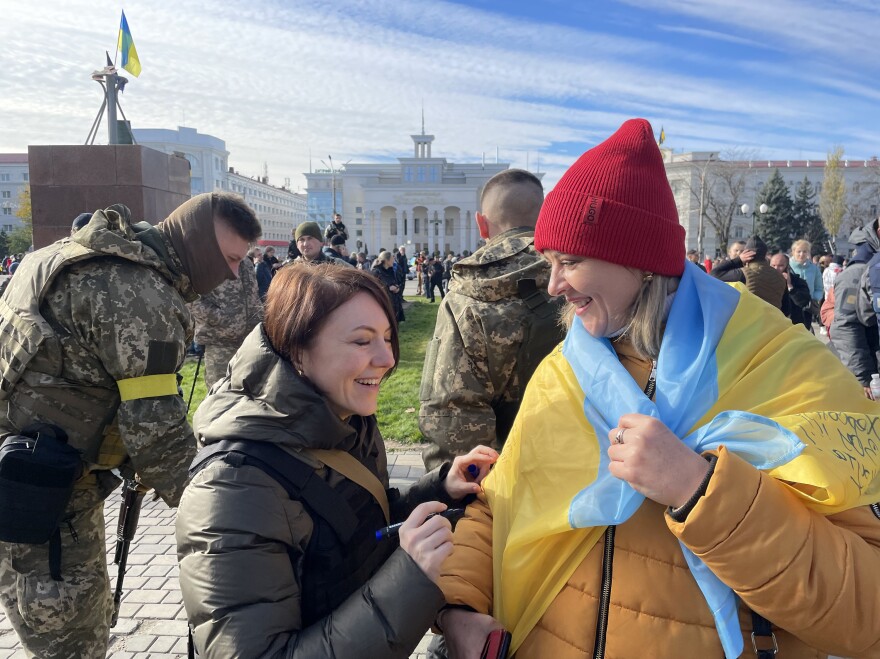KHERSON, Ukraine — Since Russian troops pulled out of Kherson last week, the city's Liberty Square has taken on a carnival atmosphere.
Residents now regularly converge on the main square to celebrate the end of more than 8 1/2 months of Russian occupation. People draped in yellow-and-blue Ukrainian flags dance, chant and sing patriotic songs. Children and grownups are giddy.
"We are so happy right now!" says 65-year-old Valentyna Banishevska. "Before [the Russian withdrawal], Kherson was like a ghost city. No one was in the streets. People were scared."
Russia's Defense Ministry last week ordered its estimated 30,000 troops in western Kherson to retreat to the east bank of the Dnipro River. On Friday, the Ukrainian military began entering the strategic southern port city and were met with jubilant crowds.
"The first time I saw cars waving Ukrainian flags last week, I didn't believe it," Banishevska says. "We thought it was some kind of provocation. We didn't believe."
![Sixty-five-year-old Kherson resident Valentyna Banishevska in Kherson on Monday. "We are so happy right now!" she told NPR. "Before [the Russian withdrawal], Kherson was like a ghost city. No one was in the streets. People were scared." Banishevska says when she realized Kherson was actually liberated, she and her neighbors danced in the streets.](https://npr.brightspotcdn.com/dims4/default/9f2f862/2147483647/strip/true/crop/3000x2248+0+0/resize/880x659!/quality/90/?url=https%3A%2F%2Fmedia.npr.org%2Fassets%2Fimg%2F2022%2F11%2F15%2Fimg_1130_custom-2dc42024fa217f71384fc652ce6d39b02c4f9b0b.jpeg)
Under Russian occupation, residents only had access to Russian internet, Russian television and Russian cellphone service. Communicating with relatives or friends in other parts of Ukraine, residents say, was nearly impossible — as was getting accurate information about the war.
Banishevska says when she realized Kherson was actually liberated, she and her neighbors danced in the streets.
The president made a surprise visit
On Monday, Ukrainian President Volodymyr Zelenskyy made an unannounced visit to Kherson and triumphantly walked the city's streets. He was greeted by hundreds of people shouting his name and "Glory to Ukraine!"
Later, Zelenskyy said the fall of the strategic southern port city was a key moment in the war.
"We are coming step by step to all the temporarily occupied territories of our country," he said. "It is difficult, it is a long and hard path. The best heroes of our country are in this war."

Nataliya Makhanko cheered on Zelenskyy and confesses to NPR she had no idea he was coming to Kherson. She had just been out walking her dog, Marshmallow, and saw the crowd.
"We don't have electricity. We don't have water," Makhanko says. "It's been very hard. But now we feel free! It is incredible."
She says when the city was under Russian control, she felt cut off from the world. "When we went to the market it felt uncomfortable," she says. "Like it was no longer our town."
Western weapons were key
On Monday, Ukraine's deputy defense minister, Hanna Malyar, also turned up in the square. An elderly woman asked Malyar for a hug and said, "I can't believe you are real!" Other residents, to the chagrin of her heavily armed security detail, lined up to get selfies with her.
Malyar told NPR the counteroffensive in this region would not have been possible without weapons donated by the United States and other Western nations.
"Ukraine's success depends on two points," Malyar says, as young boys crowd around to admire her bodyguards' rifles. "First our strength, our ability to fight. And second, the weapons that we receive from our partners."

She says Western missile systems allowed Ukrainian forces to hit Russian supply lines deep inside Russian-held territory. Disrupting the flow of Russian ammunition, food and other supplies to the front lines, she says, significantly weakened Moscow's troops. Malyar says this has been a significant factor in Ukraine's successful counteroffensive in the country's south.
Behind her in the center of the square, a group of girls who appear to be 8 or 9 years old, wave a Ukrainian flag that's taller than them and break out into song. It's "Oh, the Red Viburnum in the Meadow," a patriotic Ukrainian march from the early 20th century, that has become a symbol of the war.
Singing it was banned in Crimea after Russia seized the peninsula from Ukraine in 2014.
Despite the festive atmosphere in the center of Kherson over the last few days, many residents say the more than eight months of Russian occupation was scary. Several people recount having friends and family vanish after being detained by the Russian occupying forces. One man tears up as he talks about the fear that he or a loved one might disappear into Russian detention.
Part of the joy in the city now, he says, is that that fear has been lifted.
Polina Lytvynova contributed to this report.
Copyright 2023 NPR. To see more, visit https://www.npr.org.



